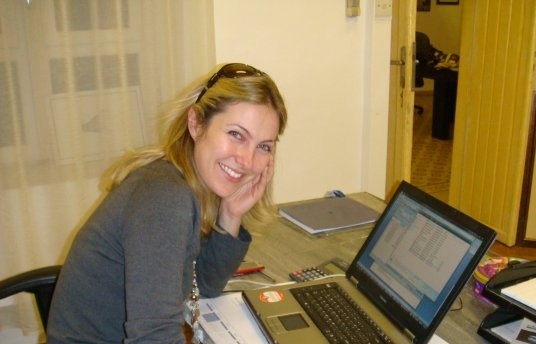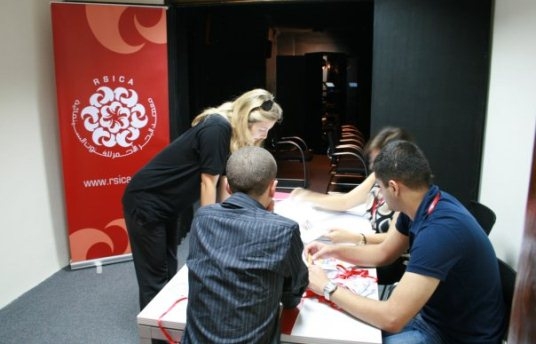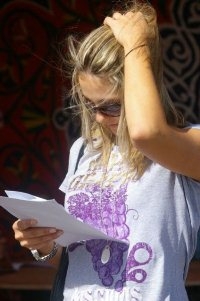أهل السينما: كلير نابر ماتالكا
17 أبريل 2011

-ولدت كلير نابر ماتالكا في الأردن، وهي الآن تتولى قسم التنمية المؤسساتية في معهد البحر الأحمر للفنون السينمائية في الأردن، كما تعمل ممثلة عن لجنة السينما الملكية الأردنية في لوس أنجلوس. عملت كلير في عمان، ولندن، وسيدني في مجال الموسيقى، والتسويق، والاذاعة، والتلفزيون والسينما، فقادها شغف حياتها للكتابة لنيل شهادة ماجستير في الكتابة الابداعية من جامعة نيو ساوث ويلز في سيدني عام 2002. عادت كلير إلى موطنها عمان عام 2006، فعملت جنباً إلى جنب مع دين جايمس هيندمان كمديرة مشاريع وأحد الأعضاء المؤسسين لمعهد البحر الأحمر للفنون السينمائية. تخطط كلير للاستمرار في كتابة وإنتاج الأفلام الروائية، وتنسيق المشاريع التي تساهم في بناء الجسور الثقافية بين الشرق والغرب، وتمكين المواهب المحلية وإعلاء صوت الحداثة الشرق الأوسطية في العالم.
مؤسسة الدوحة للأفلام: أهلاً بك كلير، وشكراً لتواجدك معنا! أخبرينا القليل عن نفسك.
كلير: اسمي كلير نابر ماتالكه، وأنا أردنية من أم أسترالية، وقد ولدت ونشأت في مدينة عمان الجميلة. أعمل حالياً بين العقبة، وعمان، ولوس أنجلوس، رئيسة لقسم التنمية المؤسساتية في معهد البحر الأحمر للفنون السينمائية في الأردن وكممثلة عن لجنة السينما الملكية الأردنية.

Claire at RSICA.
مؤسسة الدوحة للأفلام: منذ متى تعملين في هذا المجال، وكيف دخلتي إليه؟
كلير: في مراحل عدة من حياتي، عملت لفترات وجيزة في التلفزيون والسينما، لكن بداية عملي الجدي حين توظفت في معهد البحر الأحمر للفنون السينمائية في مايو 2006. كانت الصناعة السينمائية في الأردن (وحول الشرق الأوسط) تتكون ببطئ شديد، ورأيت أن أهم خطوة هي بالبحث الحقيقي عن السينما ومجال الدراسات السينمائية حول العالم، بالاضافة إلى ما هو موجود والمؤسسات والمعاهد الناشئة في المنطقة.
مؤسسة الدوحة للأفلام: انطلاقاً من عملك في المنصبيْن الذيْن تشغلينهما في الأردن وأميركا، أخبرينا المزيد عن المؤسستيْن.
كلير: تأسست لجنة السينما الملكية الأردنية عام 2003، ومن مهامها كان تطوير سينما أردنية قادرة على المنافسة على الصعيد الدولي، وهذه كانت إحدى رؤى الملك عبدالله الثاني لتنمية الدور الاقتصادي والثقافي الأردني في المنطقة والعالم. تتألف اللجنة من عدة أقسام، منها قسم بناء القدرات الذي ينظم العديد من ورشات العمل الانتاجية، والندوات، والمحاضرات، ومختبرات الكتابة وعروض الأفلام، بالاضافة إلى توفير المعدات السينمائية مجاناً للسينمائيين المحليين؛ كما توفر اللجنة خدمات في الانتاج، لتسهيل ودعم الانتاج محلياً ودولياً، في الأدرن، وتساعد في البحث عن مواقع للتصوير، وتأمين التصاريح، والمعلومات اللازمة، والاتصالات بالأشخاص المعنيين في السينما المحلية.
وقد نشأ من رؤية الملك عبدالله معهد البحر الأحمر للفنون السينمائية، وهي أول معهد أردني يوفر التدريب الاحترافي والمتقدم في مجالات السينما والتلفزيون وتشكيلة واسعة من وسائل الاعلام الجديد والتي تهتم بنشر الثقافات وتطوير المواهب الفريدة في الأردن والشرق الأوسط، ونشرها في المنطقة والعالم. ولقد افتتح عام 2008 في العقبة، مدعوماً من التعاون التاريخي مع لجنة السينما الملكية الأردنية وجامعة كاليفورنيا الجنوبية للفنون السينمائية، وقد تمكن من تخريج الدفعة الأولى في الفنون السينمائية في مايو الماضي.
ويعمل معظم خريجي هذه الدفعة الأولى في مختلف المجالات السينمائية في الأردن حالياً، وفي الشرق الأوسط والعالم، يعملون على تطوير شغفهم بمجالهم كل على طريقته الخاصة والمبتكرة. بعضهم يعمل في مجال الانتاج، أو صناعة الأفلام، أو قد بدؤوا بتأسيس أعمالهم الخاصة، أو يعلمون في الجامعات ومجالات أخرى كثيرة. نحن فخورون جداً بإنجازاتهم، كما كنا نشعر بالغبطة عند رؤية تكونهم ليصبحوا كتاباً سينمائيين أو صناع أفلام في الجزء الأول من مسيرتهم المهنية في معهد البحر الأحمر. لدينا فريق آخر من المفترض أن يتم تخريجه خلال شهر، وأعلم أنهم جميعهم قادرون على إنجاز الكثير في المستقبل، إن شاء الله.

Claire at RSICA's graduation ceremony.
مؤسسة الدوحة للأفلام: ما الذي ألهمك لتولي مناصبك هذه كلها، وما الذي تشعرين أنك حققتيه من خلالها؟ وما هي المنافع التي عادت بها على المجتمع؟
كلير: شخصياً، لم أجد ما يلهمني أكثر من اشتراكي بمشروع تضمن رد الجميل للبلد الذي أرغب بأن أساعد في نموه، وتمكين قوته البشرية المحلية، وتحويله إلى مركز للاستثمار في المواهب المحلية. أما بالنسبة لدوري في لوس أنجلوس، ليس بوسعي القول سوى إني أساهم في الترويج للأردن كوجهة رائعة للانتاج، وللمعلمين الذين يستطيعون المجيء للمساهمة في بناء صناعة سينمائية مستدامة، بالاضافة إلى مساهمتي في الترويج للأردن نفسها بكل قصصها الحقيقية والمذهلة، في العالم كله.
مؤسسة الدوحة للأفلام: ما هي المجالات السينمائية الأخرى التي تعملين بها؟
كلير: أنا دائماً أقرأ النصوص السينمائية، كجزء من عملي أو من رغبتي المستمرة في تعلم المزيد عن هذا المجال، وهو أمر أستمتع به كثيراً. أحاول أن أستمر في الكتابة طوال الوقت، وللقيام بذلك يجب أن أستمر بالقراءة، والاشراف على الكتابات والنصوص السينمائية لآخرين. بدأت أتعلم المزيد في السنوات الأخيرة واختبار النصوص المسرحية والانتاجات الابداعية.

Claire is reading a script.
مؤسسة الدوحة للأفلام: أخبرينا المزيد عن الكتابة الابداعية – لا سيما المشاريع المختلفة والفيلميْن القصيريْن اللذيْن أعددتهما في السنوات الأخيرة
كلير: أحببت الكتابة منذ طفولتي، وقد تمكنت أخيراً من الارتقاء بهذا الشغف إلى المرحلة المهنية رسمياً، بعد أن حزت على شهادة ماجستير في الكتابة الابداعية من جامعة نيو ساوث ويلز في سيدني. ذهبت إلى هناك كي أدرس مادةً لمدة ستة أسابيع، كي أتعلم طريقة جديدة في الكتابة، ولأنني لطالما أحببت السينما. وبعد سنوات عدة، قرأ أخي تامر (هو أيضاً مخرج وصانع أفلام) النص السينمائي الذي كتبته خلال فترة دراستي لهذه المادة، وأعجبه كثيراً، وقررنا إنجازه بمعاونة عدد من أصدقائنا عام 2006. هذا الفيلم القصير “ديفاين أوفر” – هو عبارة عن كوميديا سوداء حول رجل تتركه صديقته لتتزوج من آخر التقت به لتوها، وحين يعمد على ملاحقتهما في كل مكان، ليتمكن من اكتشاف الخطأ الذي ارتكبه وأدى بها إلى هجره، ينتهي به الأمر إلى تنفيذ حكم بالالتحاق بمجموعة دعم للمهووسين بالمطاردة. إنه يلقي الضوء على الخيط الرفيع ما بين الجنون المؤقت والدائم. أحب معالجة قضايا البشر العالقين في ظروف غريبة.
كانت تلك تجربتي السينمائية الأولى مع مجموعة من الأصدقاء، وقد استمتعنا جميعنا بالعمل فيه – أتذكر أن أشخاصاً عملوا فيه سوياً لإنجازه، لساعات طويلة، دون أجر، وكيف شعر الجميع بالترابط خلال هذه العملية. عام 2008، أسس أخي تامر وشريكه يزن شركة اسمها شاشتي، وأعدا فيلماً لعرضه عند الافتتاح اسمه “عالم جميل“، مولته زين وتم تصويره في الكويت. كان الفيلم غنائياً، فيه خمس أغنيات أصلية. وقد تلقيت إتصالاً طلبوا فيه مني من كتابة كلمات تلك المقطوعات الموسيقية، لرواية قصة الفيلم. كانت تلك تجربتي الحقيقية الأولى في كتابة كلمات أغاني تحت الضغط. أحببت ذلك – أن أسمع الممثلين يتلفظون بالكلام الذي كتبته، لكن سماعهم وهم يغنونها بأصوات رائعة، كان أمراً مذهلاً!
بالطبع، منذ ذلك الحين كان التحدي الأكبر الذي خضته ومحاولتي الأولى في الكتابة السينمائية هو الفيلم الروائي الطويل “ياسمين“، والذي أنهيته عام 2009.
مؤسسة الدوحة للأفلام: تلقى “ياسمين” جائزة في مهرجان دبي السينمائي الدولي عام 2009، كما تم اختياره في المرحلة نصف النهائية بمختبر راوي للكتابة السينمائية في الشرق الأوسط بين 12 نصاً آخر، بالتعاون مع معهد ساندانس عام 2010. أخبرينا المزيد عن هذا النص وما الذي شعرتي به حين عاد عليك بجائزة؟
كلير: النص جاء من فكرة لطالما أدهشتني حين كنت أعيش في الأردن، وهي عن فوارق الأفكار عن الحب والزواج بين الشرق والغرب. وتحديداً، لطالما كنت مهتمة بالأسباب التي تدفع شخصين للزواج بعد أسابيع أو أشهر قليلة من تعرفهما على بعض، بعد أن يتم تدبير لقائهما وتعارفهما بحضور الأهل لفترة قصيرة. كما أنني أعلم، بناءً على نقاشات أجريتها، أن الصورة النمطية للشعور بالظلم بسبب “الزيجات المدبرة“، والذي يفترضه البعض أحياناً، لم تكن صحيحة في أغلب هذه الزيجات، حيث تبين لي أن معظم هؤلاء الأزواج كانوا سعداء بها. بعض الأشخاص الذين أعرفهم ومروا بهذه التجربة، سعداء جداً.
كنت أتحدث مرة إلى زوجي أمين حول هذه المواضيع، وذكرت أن لدي فكرة فيلم بقالب رومانسي كوميدي. أعجبته الفكرة كثيراً وشجعني على كتابتها – حتى أننا تحدينا بعضنا على أن أنهي الكتابة في فترة معينة! كان ذلك في شهر فبراير، وتمكنت في مايو من إنهاء 60 صفحة من المسودة الأولى. وحين قرأها أمين، أعجبته لدرجة أنه رغب بإخراج الفيلم بنفسه، وقد بدأت بإعادة الكتابة في الأشهر التي تلت. وقد تطورت قصة “ياسمين” إلى أخرى حول قضايا الهوية والموطن، وهما بغاية الأهمية بالنسبة لي.
أرسلنا النص إلى مهرجان دبي السينمائي الدولية عام 2009، بعد أشهر قليلة من زواجنا، وسعدنا جداً بعد أن تم اختيارنا من بين 14 فيلم مشاركاً للقاء منتجين من أجل تطوير الفكرة. وكان حضور هذا اللقاء جائزة بحد ذاته، كما أن الدعم الذي لقيناه من المهرجان والمنظمين كان أمراً لا ينتسى.
وبعد مرور الأيام الثلاثة الحافلة باللقاءات، وعرض فكرة الفيلم وحضور طاولات مستديرة، تم اختيار “ياسمين” للفوز بجائزة التنمية من بين ثلاثة أفلام أخرى. كان الشعور لا يوصف. بالنسبة لفريقنا، شكل ذلك دافعاً للاستمرار في إنجاز هذا المشروع، أما بالنسبة لي فقد عنت لي هذه اللحظة شخصياً وأثرت في أعماقي، وشعرت كما لو أن الكون يدفعني للاستمرار في الكتابة، وأن الوقت مناسب جداً لذلك.
مؤسسة الدوحة للأفلام: ما الذي تعنيه الصناعة السينمائية لك؟
كلير: بالنسبة لي إنه وسيلة رائعة يستخدمها البشر للتحاور، والتعبير عن أمورهم، والتواصل، وفتح نوافذ على العالم، خارج العوالم الخفية الكامنة في العقول والنفوس البشرية. اعتقد أنها أداة أساسية نستخدمها لتسجيل تفاصيل الماضي، والتعبير عن الصور المستقبلية.
مؤسسة الدوحة للأفلام: كيف تطورت الصناعة السينمائية برأيك منذ دخلتي هذا المجال؟ وما الذي تعنيه لك هذه التطورات وللدور الذي تقومين به؟
كلير: أعتقد أني ِأشهد يومياً تطورات ونمواً في المواهب، وقد أصبح التدريب متاحاً لكل السينمائيين في المنطقة، وهذا يبعث على التفاؤل. باعتقادي الشخصي أننا، كمنطقة، في بداية مسيرة خاضتها بلدان كثيرة عبر وسائل إعلامها وصناعتها السينمائية في مراحل سابقة. أن نكون في البداية، هو أمر مثير، إنه يعطينا فرصة بناء العديد من الأمور بطريقة مستدامة، وتحقيق هدفنا بأن نروي قصصنا وتمكين مواهبنا المحلية. الآن وقد تعددت وسائل الدعم وورشات التدريب، والمعاهد السينمائية، والجوائز الاقليمية والمهرجانات (كمهرجان الدوحة ترايبكا السينمائي) التي تهدف إلى تحفيز صناعة سينمائية جادة وضخمة، كلنا نقوم بخطوات هامة في الاتجاه الصحيح.
مؤسسة الدوحة للأفلام: كيف ترين مستقبل الصناعة السينمائية في العالم العربي؟
كلير: يجب ألا تغيب عنا هويتنا واحتياجاتنا كمنطقة، في الوقت الذي نطور فيه معرفتنا مستخدمين الأدوات السينمائية العالمية. وبنفس الأهمية، يجب أن نصل إلى مستوى التمويلات الجيدة، والتي تقوم على عوامل تنافسية وعادلة، وأن تكون وسائل التوزيع فعالة، كي ترفع صناع الأفلام الموهوبين الذين يعملون بجد للنجاح. إنه أيضاً جزء من تطوير ثقافة سينمائية، وجماهير محلية لكي تتقبل الانتاجات الجديدة والتي تزيد أعدادها بشكل كبير ومتسارع. يجب أن نعمل سوياً دون توقف لتحقيق نسبة كبيرة من الجماهير، ونستثمر في مشاريع تعود بالأرباح على الممولين، ونؤمن التدريب المستمر، والتعاون على أعلى المستويات بين الأفراد والشركات ودول الشرق الأوسط.
مؤسسة الدوحة للأفلام: ما هي رسالتك لصناع الأفلام الصاعدين أو لأي شخص يرغب بالسير على خطاك؟
كلير: حاولوا البحث عن كل فرص التعلم والتعاون مع من يعملون في هذا المجال. القوة تأتي من العدد والمثابرة. فهؤلاء الأشخاص يعرفون متى يهللون لكم ومتى يوجهون لكم النقد البناء الذي تحتاجونه لتطوير أعمالكم. ثابروا على الابداع، حافظوا على شعلة شغفكم والتزامكم، ولا تدعوا أحداً يثبط عزيمتكم. كونوا مستعدين للعمل الدؤوب سعياً للوصول إلى الاحتراف، مهما كان مستوى العمل الذي تقومون به، وكونوا مستعدين لتعملوا حتى سعاةً في مواقع التصوير، إذا كان يعني ذلك أنكم ستتعلمون أشياء جديدة… حسناً سأتوقف هنا! أمر آخر بعد: لا يجب أن ننسى أبداً أن القصة هي الأهم حتى في عصر تطور تكنولوجيا المؤثرات الخاصة الذي نعيشه.
مؤسسة الدوحة للأفلام: ما هو فيلمك المفضل ولماذا؟
كلير: من الصعب علي تحديد فيلم معين، لا سيما أني أشاهد أي شيء! تشدني القصص الرومانسية الجيدة التي تتضمن حوارات قصيرة وذكية. لذا ربما “حين التقى هاري وسالي” هو جوابي لليوم!
مؤسسة الدوحة للأفلام: ما هي مشاريعك المستقبلية؟
كلير: آمل بالتعاون ودعم عدد من صانعات الأفلام. أعمل أيضاً على إعادة كتابة نص فيلم “ياسمين“، ونص آخر أستمتع كثيراً بكتابته. هذا الأخير لا يتعلق أبداً بالشرق الأوسط وهو عبارة عن قصة يمكن أن تجري أحداثها في أية مدينة كبيرة – إنها كوميديا حول الطموح الانساني. آمل أن يكون باستطاعتي إخبار المزيد عنها في الأشهر القادمة!